_We may earn revenue from the products available on this page and participate in affiliate programs. Learn more ›
_
Best For Calm-Water
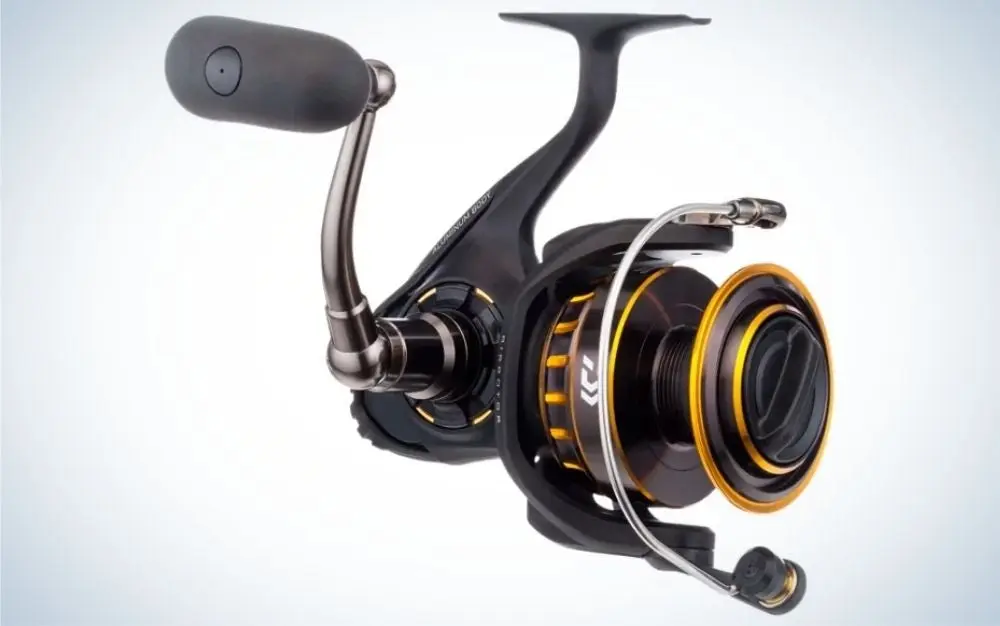
Daiwa BG
Best For Beginners
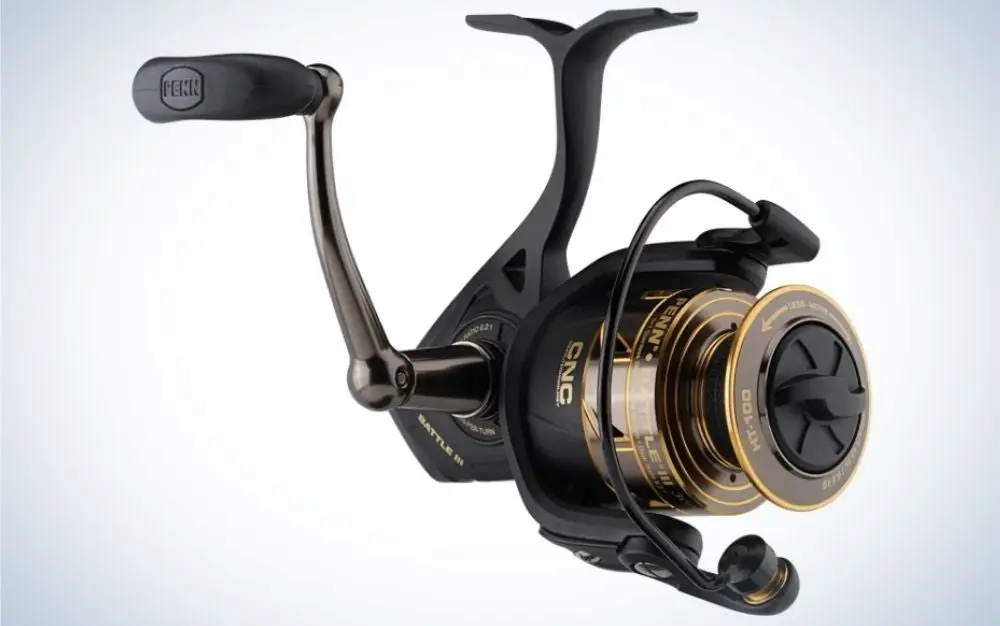
Penn Battle III
Best For Long-Casting
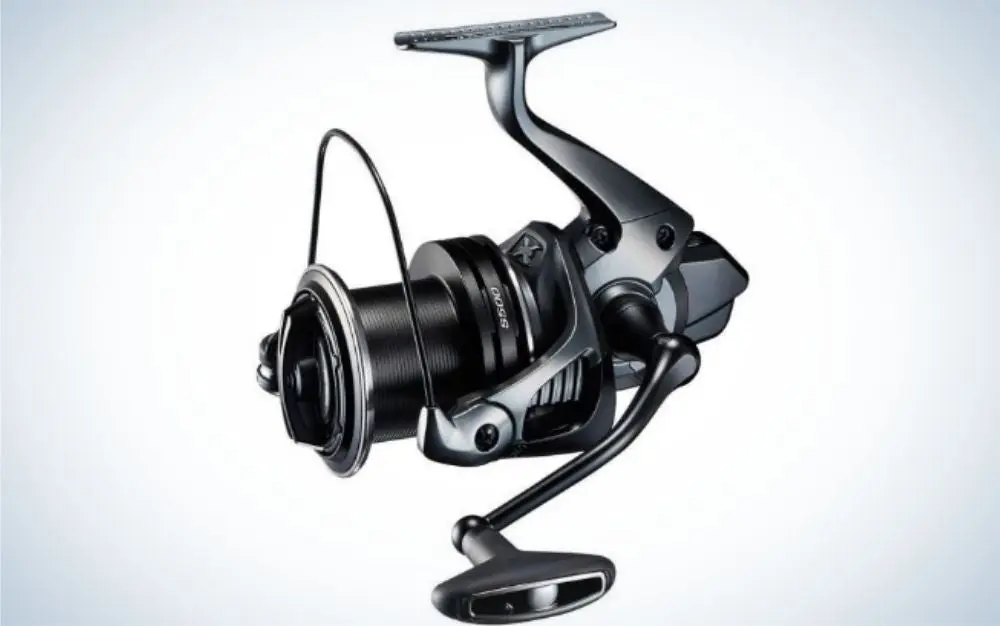
Shimano Ultegra CI4+
Surf fishing is incredibly hard on all gear and tackle, but the best surf fishing reels are up for the challenge. The reason so many reels struggle in the surf is due to the corrosive and destructive power of saltwater. Even if you never dunk your reel underwater, the occasional splashes and even spray can be enough to quickly bind gears, corrode parts, and lock up drags. Additionally, most anglers are subjecting their reels to sand and the occasional tumble onto rocks, jetties, or piers.
On the flip side, fighting powerful fish from shore also requires smooth operation, with strong internals and precise drags. Surf fishermen also need to make long casts, which means they need a reel that matches the rod and casts well. This is quite the list of requirements, and for that reason, most reels are not well suited for the surf—except the ones specifically built to withstand these harsh conditions. Here is a list of tips and recommendations for the best surf fishing reels.
Best for Beginners: Penn Battle III
Best for Calm-Water: Daiwa BG
Best for Occasionally Getting Wet: Penn Spinfisher VI
Best for the Harshest Conditions: Van Staal VSX
Best for Long-Casting: Shimano Ultegra CI4+
How We Picked the Best Saltwater Surf Fishing Reels
My choice in surf fishing reels is based on nearly 30-years of angling experience, which includes surf fishing on both the East and West coasts of the USA for a large variety of species. My primary angling pursuit is surf fishing for striped bass
, and I spend about 120 nights a season (about 700-1000 hours) chasing these fish throughout the Northeast, from New York to Canada.
I have personally used and tested a large number and spectrum of reels in both freshwater and saltwater settings—from reels costing less than $15, to reels costing more than $900. I also have many contacts with professional anglers, industry professionals, and top-tier tackle suppliers and retailers. These resources and my own significant experience have informed all my choices here. I evaluated each reel here based on the following criteria:
Durability: Can the reel withstand the rigors of regular surf abuse? There is no tougher environment for a reel than the surf, and most reels are not up to the task. It doesn’t matter how light, smooth, or strong a reel is if it can’t survive the harsh salt, sand, and rocks found in the surf.
Drag Function: Surf anglers cannot chase after their quarry; we are bound to the shore. Therefore, drag strength, smooth operation, low start-up inertia, and heat resistance become important.
Weight, Casting Functionality, and Strength: All of these factors are important, and contribute collectively to your ability to reach fish, hook them, and fight them to the shore—over and over, season after season.
Price: To put it bluntly, saltwater gear is expensive. Finding options that fit your budget will allow you to spend more time fishing, and less time working to pay for it all. However, surf anglers push their gear extremely hard, and finding a reel that is a balance between low cost and dependability can be hard to balance. Here, I gave you the strengths and weaknesses of each reel at virtually all budget options that are viable for the surf.
Best Saltwater Surf Fishing Reels: Reviews & Recommendations
Best for Beginners: Penn Battle III
Best for Beginners

Specs
Construction and Build: Full metal body and side plate, CNC gearing
Drag: 15- to 30-pounds (3000-8000 size), HT-100 carbon drag washers
Bearings: Sealed 5+1 stainless steel bearings
Pros
Built to handle surf use and sealed in the right places
Comes in a good variety of sizes
Drag is strong, reliable, and easily adjusted
Very affordable for a durable, long-lasting reel
Cons
Not as smooth as some of the competition- especially after some use
Penn has several budget-priced reels that can work for the surf fisherman—including the popular Fierce
reel—but the Battle is the best of the bunch. Penn reels have a reputation for being a bit heavier than other brands, and not quite as smooth. This trade-off comes with a reputation for being very reliable and more rugged than reels from other manufacturers like Shimano, Daiwa, or Okuma. These latter characteristics—ruggedness and reliability—make Penn reels particularly popular with surf fishermen. Many surf anglers will happily sacrifice a little bit of smoothness at the handle, knowing they have a reel that will not let them down over a harsh season on the beach.
The Battle is built around quality internal components and solid construction. It is resistant to salt intrusion and holds up well even when subjected to regular “splashes”. It will require thorough rinses and regular maintenance if you dunk it, but it’s built to last. I particularly like how easy it is to adjust the drag. The drag doesn’t go from “none” to “all” with just a few clicks but instead requires a significant number of turns, which helps with small adjustments while fighting a fish. The Battle III also comes available as a combo with a Penn rod, in a variety of sizes, which are very popular and make an excellent value.
Best for Calm-Water: Daiwa BG
Best for Calm-Water

Specs
Construction and Build: Digitally cut gears, machined handle, and waterproof drag
Drag: 15- to 33-pounds (3000-8000 sizes), Automatic Tournament Drag (ATD)
Bearings: 6+1 stainless steel bearings
Pros
Consistently cited as one of the best surf reels of all time
Strong, smooth, and rock-solid construction
Available in a wide range of sizes
Affordable price tag
Cons
Not designed for heavy splashing or to ever be submerged
The Daiwa BG is a reel that makes an excellent match for those anglers who are fishing back-bays, quiet flats, calm surf, or just never plan on getting their reel wet. It has excellent build quality that will last many years with the proper care. It is not designed to be submerged, but it will stand up OK to occasional splashes if rinsed after each use, but this is not its strong suit.
Instead, the BG is designed for those that will keep it dry. If you do that, it’s a bargain given all the technology packed into this affordable reel. It stacks up well to more expensive reels in terms of precision, strength, and quality of materials. I would argue it’s likely the best bargain on this list, and I would certainly not call it an entry-level reel, despite its price. The internals are extremely durable and are ready to tackle the largest, strongest fish you’ll hook. Further, the drag is ultra-smooth and very adjustable, with ultra-low start-up inertia.
It is worth noting that the BG also is available as a combo with a properly matched rod available for each size reel. As an alternative, if you have a bit more to spend and are looking for the “next step up” the Shimano Saragosa
is one of the greatest saltwater fishing reels available today—just don’t get it soaked, or it won’t last long.
Best for Occasionally Getting Wet: Penn Spinfisher VI
Best for Occasionally Getting Wet
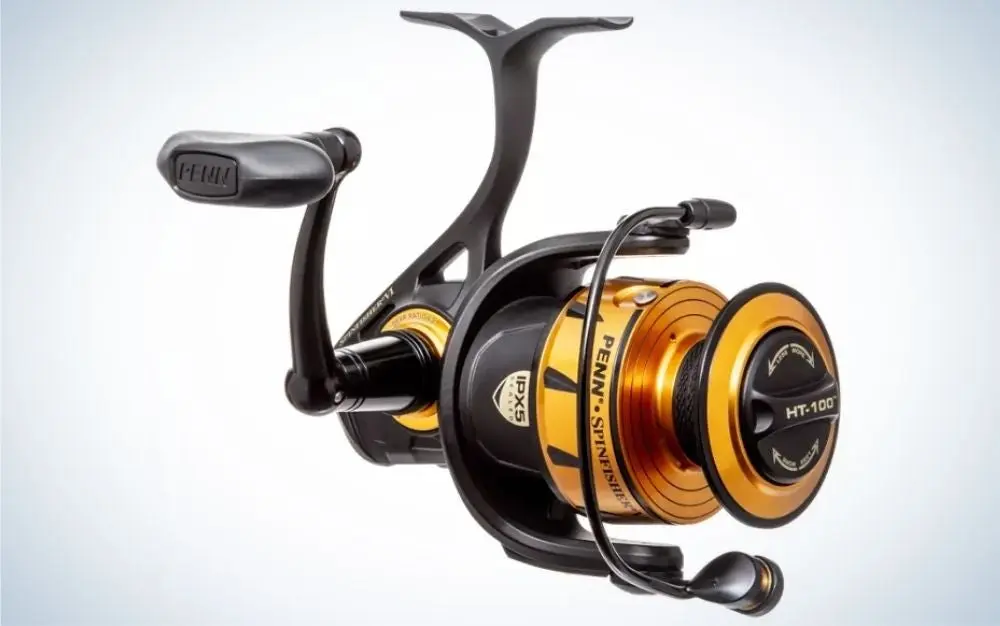
Specs
Construction and Build: IPX5 sealed spool, body, and drag. Full metal body with CNC Gears
Drag: 15- to 40-pounds (3000-8500 sizes) HT-100 carbon drag washers
Bearings: 5+1 sealed stainless bearings
Pros
Splash- and spray-proof IPX5 rating will survive frequently being splashed, and even a few dunks
Smooth and strong drag that’s easy to adjust
Strikes a great balance between price and dependability
Cons
Not as light or smooth as non-sealed reels
Not as water-tight as more expensive surf-specific reels
The Penn Spinfisher VI is designed to be splashed and sprayed with saltwater and still survive multiple seasons. The drag keeps getting better with each redesign, and I find them easy to adjust and very reliable. I also appreciate the manual bail option on the 6500-and-up sizes, and you can also get a bail-less conversion kit for the 4500 and 6500 sizes. Overall, the Spinfisher is a solid option when tackling any size fish and is a pleasure to cast. I will also point out that it’s available in large sizes, and this could be particularly tempting for anglers who need a large reel that will get splashed and sprayed. There is no other sealed reel over 8000 size that costs less than $300.
This “top pick” was the hardest for me to make, as the competition is strong. Penn’s own Slammer III
and the Tsunami SaltX
are even more watertight, with stronger bodies and internals, and better drags than the Spinfisher. However, those reels cost substantially more (roughly 50%) for a similar size. The Tsunami SaltX
is an excellent reel that stands up very well to abuse and will survive being dunked regularly much longer than a Spinfisher. However, for many anglers, the extra cost is not justified in this case, because they won’t be dunking their reels at all—except by accident.
Best for the Harshest Conditions: Van Staal VSX
Best for the Harshest Conditions
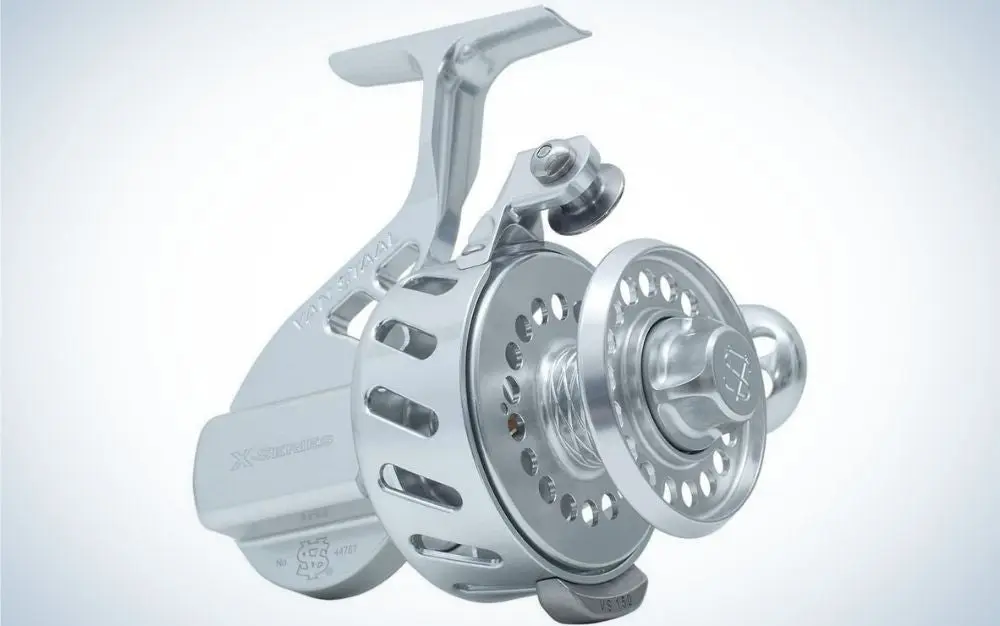
Specs
Construction and Build: Aircraft grade solid-aluminum construction, fully sealed body and drag
Drag: 30- to 42-pounds (100-275 manufacture size rating; approx. 3000-8000 industry standard)
Bearings: 6-to-8 sealed stainless bearings (dependent on size)
Pros
The most rugged reel you can buy; designed to be reeled underwater
Ultra-strong and built from solid aluminum
Simple design requires little regular maintenance
Excellent customer service and warranty
Cons
For the price, it is a basic reel that is not overly smooth
Expensive and only available bail-less
The Van Staal VSX is a tank. It is extremely strong, rugged, and durable on a level no other reel can match. Machined from aircraft-grade aluminum and truly fully sealed, the VSX is virtually impervious to saltwater. My VSX is submerged underwater regularly, sometimes for long periods, and yet functions just as well now as the day I purchased it. The only maintenance it gets is an occasional quick rinse with freshwater, and at the end of the season new seals and grease.
If you are constantly submerging your reel, subjecting it to a lot of sand, or risking dropping it on rocks, then the VSX is your pick. While the price may turn some off, consider that many 25-year-old or older Van Staals are still in action and functioning like new. While nothing is indestructible, the Van Staal VSX is as close as you can get in a surf reel.
However, the Van Staal VSX isn’t for everyone. It isn’t the smoothest reel, doesn’t have the highest-tech drag, has a relatively slow retrieve, and is expensive. The drag is also known to sometimes overheat when fighting pelagics or other gigantic, extremely hard-fighting fish that take 300-plus yards of line in a single run. For these reasons, if you’re never going to get more than a little spray of salt on your reel, but still want the very best, a Shimano Stella
are both much more smooth and precise reels, with stronger and tougher drags that don’t overheat.
Best for Long-Casting: Shimano Ultegra CI4+
Best for Long-Casting

Specs
Construction and Build: CI4+ carbon-reinforced body with water resistant drag
Drag: 33- to 44-pounds (only available in two sizes, 5000 and 14000)
Bearings: Large-diameter spool with ultra-precision line lay
Pros
Specifically designed to cast ultra-long distances in the surf
Extremely smooth operation, with perfect line-lay
Very strong drag in a lightweight body
Cons
Like many long-cast-specific reels, you pay a premium
Most reels are built around general use and make compromises to accommodate as many anglers as possible. Therefore, there aren’t a lot of reels built specifically for casting distance. However, if you are looking to cast aerodynamic lures as far as possible, the Shimano Ultregra CI4+
is my top pick. The large-diameter spool and precision line-lay can help you eek out those extra yards needed to reach the furthest sand bars, rock piles, or current seams.
The good news is you aren’t sacrificing that much to get this extra casting distance. This reel retains the legendary Shimano smoothness, has a very strong and reliable drag, and the internals are high quality. However, it is a relatively large reel because of the extra-large spool. It’s not as tough as other reels (like the Shimano Saragoosa or Tsunami SaltX), and a bit pricey. It is also isn’t sealed, and you will want to avoid getting this one wet, the body and drag aren’t sealed and only “water-resistant.”
Things to Consider Before Buying a Surf Fishing Reel
How Wet Will Your Reel Get?
The best surf fishing reels must overcome many challenges. Freshwater reels (and even some saltwater reels) are simply not up to the task of fishing the surf, and you are just wasting your money by attempting to use them. I have seen high-quality, expensive freshwater bass reels get destroyed in a single day of surf fishing—not by the size of the fish, but by the conditions. While sand is of concern (it will jam reels and ruin gears) and dropping your reel on a rock can destroy it in an instant, saltwater is the primary threat to a reel’s lifespan. Frankly, even the most rugged, expensive reels will eventually succumb to saltwater without some maintenance.
Typically, saltwater fishing reels
that are less expensive are more sensitive to saltwater and require regular maintenance when used in the surf. What “regular” means is subjective based on a variety of factors; for example, the quality of the reel, how often you use it, and how hard you push it. Some reels will need to be religiously rinsed after every session and opened up, cleaned, and re-greased if you accidentally drop them in the water even for just a few seconds. Others can go multiple seasons being splashed and occasionally submerged with nothing more than a quick rinse after each outing and an end-of-the-season greasing. But, without a doubt, you’ll pay for this luxury. I don’t just mean in terms of dollars and cents, but also smoothness, precision, and weight.
What Size Reel Matches Your Style?
Reel size is an important consideration when choosing the best surf fishing reel. Shore-based anglers are often faced with really long-distance casts, and sometimes with heavy lures or bait. An unbalanced rod and reel combo won’t cast as well as a properly balanced setup, which can ruin the fishing experience (and limit your catch numbers). The longer and heavier the rod, the better a larger and heavier reel will match it. I believe the best way to choose reel size is by:
1. Deciding on what lures or bait you’ll be using most
2. Matching this requirement to a properly rated rod
3. Choosing a reel to match the length and weight of the rod
The good news is most rods will pair well with a spectrum of sizes; for example, a rod may work just as well with either a 4000, 5000, or 6000 size reel, but not a 3000 or 8000.
The other factor that comes into play with reel size is how much line capacity
you will need. This requirement boils down to how far you will need to cast, and how much line the species you’re targeting will take during a fight. If you don’t need to cast more than 100 feet, or the fish you’re targeting will only take small amounts of line (or none), you can lean towards a smaller reel. However, if you’re casting extremely long distances and/or facing fish that take extremely long runs, you will need to lean towards a larger reel.
Overall, most surf anglers will be best suited with a reel between 3000 and 8000, and 4000 – 6000 sizes are most popular, though manufacture size-ratings can vary, and some anglers may want to use reels in excess of the 12000 size.
How Important is Drag to You?
Saltwater fish are powerful, and as shore-based surf fishermen, we have no ability to chase after a huge fish if it decides to take off into the open seas. Instead, we must rely solely on our muscles and drag to fight the fish. How strong and smooth the drag is always matters, but if you are targeting smaller species, like pompano or croaker, you can choose a more moderately priced reel with lower drag ratings.
However, it isn’t just a drags strength rating that matters. Start up inertia, overheating, and adjustability are all crucial as well. Start up inertia is the amount of pressure a fish must overcome to get the drag moving. This number is often much higher than the running drag pressure, particularly on lower-priced reels. Unfortunately, this initial bit of extra pressure at start up can result in knots breaking. The good news is, high-quality saltwater reels have little or no start up inertia, and this is yet another reason to choose a reel specifically designed for saltwater fishing. As a side note, poorly cleaned and maintained drags will succumb to significant start up inertia no matter how expensive they are.
Finally, the adjustability of the drag matters if you’re constantly changing drag pressure. Many moderately- and higher-priced reels are very easy to adjust, with smooth transitions from “a little bit” to “a lot” of drag. Other, less expensive reels can be quite annoying, with just a few clicks of the knob, they can go from “nothing” to “locked”, resulting in a broken line, lost fish, and an angry angler.
What’s Your Budget?
Like most other saltwater-specific gear, surf fishing reels are expensive, but you get what you pay for.
Generally, the more you pay for a reel:
The better protected it will be from saltwater (though not always true)
The stronger the drag will be, and the smoother it will function
The stronger and tougher the gears and vital components of the reel will be (including the body, handle, and gears)
While we all want to save as much money as we can, I insist that you choose your reel budget carefully. It is truly amazing how fast the surf will destroy a reel. A “cheap” reel isn’t cheap if you have to buy a new one every month or lose a personal best because it fails in the middle of the fight. I think either going with a budget, more basic reel, or a top-tier surf-specific reel (and not something in between) is the best idea.
FAQs
Q: How do I choose a surf fishing reel?
Start with what lures and bait you’re going to be using, match that to a rod that covers your needs, then finally match a reel to the rod. For example, if you are an angler looking to cast lures ranging from 1- to 4-ounces, and would like to cast long distances, you would likely choose a rod 10- or 11-feet-long rated to between 1- and 5-ounces (making sure to leave room at the top end to not max out the rod’s capabilities). This length and rod rating would then likely best match with a reel in the 5000-8000 size range. If you aren’t concerned about line capacity and want lighter weight and lower cost, the 5000 size might make sense.
Q: How much do surf fishing reels cost?
Generally, I would expect to spend at least $120 for a reel that will stand up to a few seasons’ worths of regular surf use, even if it’s not going to be getting splashed or dunked. I went the cheap route when I first started, and regret that decision. It cost me more in the long run. The Penn Battle III and Daiwa BG range from about $130 to $160 and are my top picks. If you intend on only using your reel on vacation, or a few times a year, a reel like a Penn Fierce ($75-$115) can get you started. However, if you are going to be fishing a lot (more than three nights a week) and/or plan on getting your reel wet regularly, you should be prepared to spend more- or you will be replacing your reel at least every season. Highly-sealed reels designed to get splashed a lot, and dunked occasionally, start around $200-300—the Penn Spinfisher VI
, and Tsunami SaltX
are good places to start.
Best Saltwater Surf Fishing Reels: Final Thoughts
Best for Beginners: Penn Battle III
Best for Calm-Water: Daiwa BG
Best for Occasionally Getting Wet: Penn Spinfisher VI
Best for the Harshest Conditions: Van Staal VSX
Best for Long-Casting: Shimano Ultegra CI4+
There is no single reel choice for every angler, and this is particularly true for surf anglers. Realistically determining how much saltwater your reel is going to be splashed with is a huge factor, but not the only one. After determining how wet your gear is going to get, make sure you choose a reel that balances with your rod and bait requirements, with a strong enough drag to subdue the largest fish you’re likely to encounter. Make your choice carefully and deliberately, and it will increase your catch rate—and enjoyment—in the surf.
Why Trust Us
For more than 125 years, Field & Stream has been providing readers with honest and authentic coverage of outdoor gear. Our writers and editors eat, sleep, and breathe the outdoors, and that passion comes through in our product reviews. You can count on F&S to keep you up to date on the best new gear. And when we write about a product—whether it’s a bass lure or a backpack—we cover the good and the bad, so you know exactly what to expect before you decide to make a purchase.
![Field & Stream [dev]](https://images.ctfassets.net/fbkgl98xrr9f/1GnddAVcyeew2hQvUmrFpw/e4ca91baa53a1ecd66f76b1ef472932b/mob-logo.svg)





